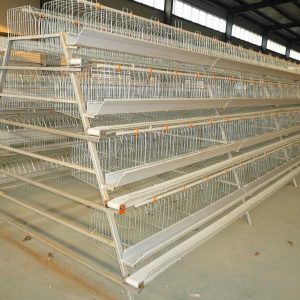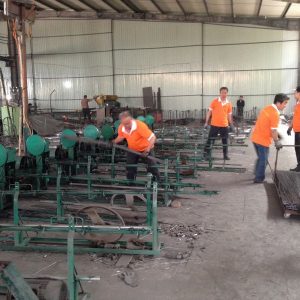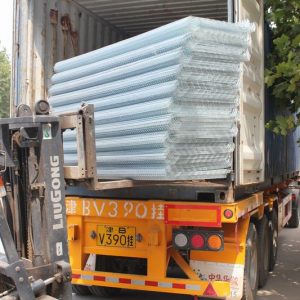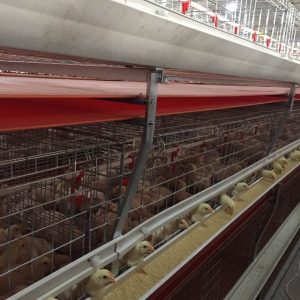
Three tips for chickens to resist heat stress
Recently, egg prices have risen sharply, and they are in a dividend period for raising chickens. The heat stress caused by high temperatures to chickens has led to a decline in egg production and poor eggshells, which has affected economic benefits. In response to the heat stress of chickens, farmers must manage the chickens carefully, help the chickens to dissipate heat, let the chickens eat, drink, and digest well, while reducing the incidence of diseases and improving the efficiency of raising chickens.
1. Help heat dissipation and reduce heat production
1. Heat dissipation of hardware facilities
In summer, the house is cooled by fans and wet curtains. When the temperature of the house is lower than 28 ° C, increase the wind speed of the house by turning on the number of fans, and use the wind speed to cool down to help the chickens dissipate heat. When the house temperature exceeds 28 ° C and the humidity is within 85%, the intermittent opening of the wet curtain helps the chickens to dissipate heat; if the humidity exceeds 85%, the cooling effect of the wet curtain is significantly reduced, and the cooling of the wet curtain plus wind speed helps the chickens to dissipate heat . In extreme high temperature and high humidity weather, you can try to use the air conditioner to remove humidity and cool down. For small and medium-sized chicken houses, you can follow the sunscreen on the roof of the chicken house to reduce heat radiation.
2. Adjust the feeding density
In summer, adjust the flock density, eliminate sick and weak chickens and widows in a timely manner, reduce feeding costs, and provide a better environment for high-yield chickens. In general, the appropriate density during the laying period is 450 cm2 per chicken.
3. Install power generation equipment
In the high temperature season, the chicken farm is best to be able to stay away from others. The chicken farm should be installed with generators and regularly checked to ensure normal operation. In addition, it is best to install a power outage alarm in the chicken coop, so that when a sudden power outage occurs, it can be detected and handled in time.
Second, eat well, drink well, digest well
1. Nutrition adjustment
The metabolic heat of oil and fat is almost three times that of corn. In summer, 1.5-2% vegetable oil is added to replace 3-4% corn, reducing the metabolic heat production of chickens. The protein level remains unchanged, increasing the content of methionine and lysine. Increasing the content of vitamins and minerals, adding 200-250 grams of vitamin C, 0.3% baking soda and 0.15% potassium chloride per ton of feed is beneficial to maintain egg production rate and improve eggshell thickness.
2. Feeding skills
Feed each before 6 o’clock in the morning and after 6 o’clock in the evening, each feeding amount accounts for 30% of the whole day’s feeding amount. At 10 a.m. and 4 p.m., uniform or small amount of replenishment. No feeding at noon and in the afternoon when the temperature is higher, which increases the hunger of the chickens. At 12 o’clock at night, supplement the light for 1 hour and feed again.
3. Drinking water skills
In summer, chickens drink 3-4 times more water than they eat. Chickens dissipate heat by drinking water to alleviate heat stress, so water shortages should never occur on hot days. Check the water level of the water line every morning and afternoon after entering the chicken house to ensure that there are no water cuts or leaks and to ensure that the chickens drink normally. At noon and afternoon, provide ice water or use deep well water to increase heat dissipation.
4. Intestinal health
In summer, the chickens drink more water and eat less, the feed cannot be fully absorbed, and the chickens are severely dilute. In order to help the intestines of the chickens to better absorb the nutrients in the feed, regularly use micro-ecological preparations and enzyme preparations, such as Bacillus, yeast, and lactic acid bacteria, to promote the digestion and absorption of the feed and convert them into the nutrients required by the chickens. substance.
3. Reduce disease
1. Prevent feed mildew
Feed materials should be selected from high-quality, non-mouldy materials; warehouses that store feeds should be well ventilated and dry; long-term use of mold removers, such as mold decomposers containing glucose oxidase, to decompose harmful mycotoxins in the feed Into a non-toxic substance. Check the quality of the feed during each feeding to ensure that there is no moldy feed; the material storage in the summer feeder should not exceed 3 days, and the feeder should be thoroughly cleaned once every half a month.
2. Waterline disinfection
Disinfect and rinse the drinking water pipe twice a month to ensure the chickens have clean water. Before turning off the lights at night, choose water disinfectants such as chlorine preparations and oxidants, soak the water pipes overnight, and before the next morning dawn, flush the water pipes in reverse to quickly damage the biofilm on the wall. In addition, give chickens an acidifier and vinegar for 1 day a week to reduce harmful bacteria in the water.
3. Disinfect chicken
In summer, pathogenic microorganisms multiply quickly, and sterilize chickens 2-3 times a week to reduce the bacteria content in the environment. When choosing a disinfectant, use different types of disinfectants such as quaternary ammonium salt, povidone iodine, and sodium hypochlorite alternately.
The above are the 3 tips for improving the efficiency of raising chickens in summer, and I hope to help them.



